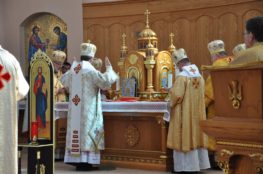Despite the Ukrainian Greek Catholic Church’s (UGCC) widespread dissatisfaction with the so-called “Havana Declaration” between Pope Francis and Patriarch Kirill of Moscow, the heads of the UGCC were in Rome last Friday to both commemorate the sorrowful 70th anniversary of the “Pseudo-Synod of Lviv” which liquidated the Ukrainian Church and reaffirm the UGCC’s ties to Rome and the Holy Father. Here is an excerpt from the official address of the UGCC’s Holy Synod:
We have been in Rome on the eve of the 70th anniversary of what historians call the “Pseudo-synod of Lviv.” Orchestrated 8-10 March 1946 by Stalin’s regime to liquidate the Ukrainian Greek Catholic Church (UGCC) this “synod” was held without any Greek Catholic bishops, since all had been imprisoned. Despite being beaten, tortured, and threatened with long prison sentences and even death, they had all refused to deny communion with the Pope. As a result the UGCC became the largest completely outlawed Church in the world. Its property was transferred to the Orthodox Church of the Moscow Patriarchate or confiscated and used for secular purposes. Stalin wanted to cut the ties of Ukrainian Greek Catholics with the Bishop of Rome. Many of the bishops died in prison or in the Gulag. Hundreds of clergy and religious and tens of thousands of laity met a similar fate.
However, our hope and “our help is in the name of the Lord, the maker of heaven and earth” (Ps 124:8). Today the Soviet Union is gone, and the once powerful persecutors are consigned to history and divine judgment. Meanwhile, the martyrs are being canonized, and their spiritual children grow in spirit and number. “And we know that all things work together for good to those who love God, to those who are the called according to His purpose.” (Rom 8:28). The Lord has blessed the suffering and sacrifice in order to fulfill his purpose. At the beginning of twentieth century —the century of sacrifice— the UGCC had three western-Ukrainian eparchies (dioceses) with three bishops. Today it has thirty-three eparchies and exarchates with 53 bishops on four continents. If in 1989, at the end of the catacomb period, only 300 aged priests remained of the 3000 pre-war clergy, today there are again 3000 priests with an average age of 38. The Church in Ukraine is vibrant and dynamic. We came to Rome to reaffirm communion of the revived UGCC with the Holy Father and to bear witness to our unity with the Universal Catholic Church.
. . . .
We hope that His Holiness will initiate and support new steps to help relieve the dire hardships endured by millions of Ukrainians, that he will speak out on their behalf and encourage international aid. The UGCC stands ready to facilitate responsible, transparent, ecumenically sound administration of international assistance, serving the Ukrainian population without regard to ethnicity, political or linguistic preferences or religious affiliation. We are ready to cooperate in a well-coordinated plan that includes governmental and non-governmental bodies in order to lift the suffering out of their need, meeting both short-term and enduring needs of those affected by the humanitarian crisis caused by the invasion of Ukraine. Enough of this suffering! It can be prevented. It can be healed. Let us make the “Year of Mercy” a reality for the people of Ukraine.
The Holy Father responded in kind with his own letter to the UGCC hierarchy and faithful:
“Now who is there to harm you if you are zealous for what is good? But even if you should suffer for righteousness’ sake, you will be blessed. (…) In your hearts honor Christ the Lord as holy, always being prepared to make a defense to anyone who asks you for a reason for the hope that is in you; yet do it with gentleness and respect…” (1 Peter 3:13-15).
Making mine the words of the Apostle Peter, I express my profound recognition for your fidelity and I encourage you to make yourselves tireless witnesses to that hope which makes more luminous our existence and that of all our brothers and sisters around us. I also renew my solidarity with the Pastors and faithful for all they do in this difficult time, marked by the tribulations of war, to alleviate the sufferings of the population and to seek the paths to peace for the beloved Ukrainian land.
Our courage and our joy is in the Lord. And it is to Him that I turn, through the intercession of the Blessed Virgin Mary and the martyrs of your Church, that divine consolation illuminate the faces of your communities in Ukraine and in other parts of the world. Meanwhile, from the heart I impart to You and to the Bishops, the priests, the religious and the faithful of the Ukrainian Greek-Catholic Church a special Apostolic Blessing as a sign of my continued affection and remembrance.
Some might argue — quite understandably — that Pope Francis should have taken this opportunity to speak out forcefully against the aggressive actions of the Russian state and the “Russian World” ideology currently being promoted by the Russian Orthodox Church. Even so, it is heartening to see brother bishops affirm unity despite obvious disagreements over ecumenical policy and political engagement. Perhaps other, traditionally minded, Roman Catholics might learn a thing or two from the example of their Greek Catholic brethren.



